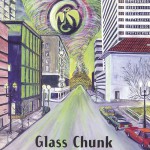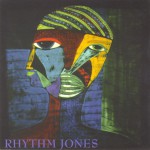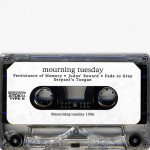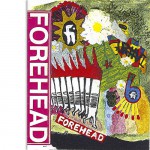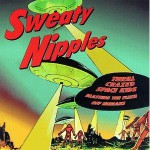 Sweaty Nipples
Sweaty Nipples
Thrill Crazed Space Kids…
Elemental Records
The Nippers have retreated, somewhat from their Megaforce profile of yesteryear, to release a recording on Eugene-based Elemental; maintaining the same essential production team as in former incarnations (Kelly Gray) and the personnel seem intact. But somewhere along the way Sweaty Nipples learned to rock.
Responsibility for the fashioning of this transformation lies squarely in the hands of guitarist Ryan Moore. He has developed into a singularly unique and keenly adept lead guitarist— firing off stinging runs and chunky riffs with èlan and flair. As a result of Moore’s growth as a guitarist, and the rhythm section’s maturation into a versatile ensemble, Sweaty have evolved from a whiterap party band into a serious aggregate).
The metamorphosis is evident from the first cut, “Uncle Slim.” Over roiling guitar chords, vocalist Scott Heard details illicit farm incidents that would seem to have their antecedent in the Who’s Uncle Ernie. Meanwhile, Moore adds the drive, with a searing solo and a series of pyrotechnic embellishments along the way.
“The Night I Screamed” stalks upon a throbbing drum beat and a strangely compelling chorus; nuked to a crisp by Moore’s blazing chord barrage. The twisted clockwork of Moore’s guitar in the verses of the oddball “Nice,” alternates with the bombastic turnarounds, while Heard weaves a slick seduction with knowing panache.
Striding upon a swaggering big-beat, “Dumbass” combines the raucous anti-establishment fervor of the Ramones with the dangerous familiarity of Cheap Trick for a chorus that sticks to the brain like a spilled beer. The jungle beat of “Camaro” propels a similar lyrical sentiment (which would appear to bemoan the plethora of screwed up people in our society), while Moore’s Page-influenced guitar lines slither and snake across the sonic landscape.
“Favorite” and “The Mother In Me” revert to one of Sweaty’s erstwhile personnae, with a jack-booted double time stomp through the former and the full throttle flat tire beat of the latter. But “Lovely Coma” stretches those elements into the Pop realm with a tight, harmony filled chorus that has more in common with Van Halen than the Beastie Boys.
And with that in mind, the hit of the litter is the rattlesnake shake of “Screwed By Julie.” Over a sliding box of rocks into, Moore injects snarling slide guitar and a snapping, sidewinder riff— timelessly recalling the work of Peter Green on the early Fleetwood Mac classic “Oh Well.” The relentless interminable slam of the snare drum launches “Freedom Of Choice,” another catchy number. Moore’s timeless blues-tinged licks provide the framework for more of Heard’s thoughts on alienation and fun, two of his favorite topics.
While riding the trends for several years, Sweaty Nipples made waves, landing a big contract and air time on MTV. But the sound they present on Thrillcrazed Spacekids harkens to the roots of rock, ensuring for the band many more records to come— longevity in the fickle world of popular music.
Glass Chunk
World Without End
Self-Produced
Highly stylized funk/metal is Glass Chunk’s forté, impeccably recorded here; a fact which serves to throw into clear relief the band’s strengths and weaknesses.
Among their strengths are a formidable rhythm section. Drummer Brian Foxworth and bassist Tom Nunes lay down precise, intricate patterns that incorporate the aforementioned styles as well as flavors of jazz, reggae and latin over which guitarist Calvin Baty contributes blustery, if predictable wankery.
Above this sturm quavers the full-throated tenor outpourings of Tony Mandella whose clear influence was Dennis De somewhat full-throated tenor drang of Tony Mandella, e clear vocal influence was Dennis DeFrance of Styx. It is readily apparent that Mandella takes himself pretty seriously; but his voice is one of those instruments that demands attention. Like him or hate him, you have to listen to Tony.
Not that he really has that much to say. He sounds like he’s saying something profound on “Street,” singing, “when I’m falling/don’t hear me calling/cause I remind you of your fears.” Baty’s chiming guitar firgure sets the mood for “Never Felt,” a somber ballad, reminiscent, in some strange way, of Kansas. The tight vocal harmonies do little to dispel this notion; although Baty’s ethereal solo lifts the procedings above the mundane— “where did I leave my soul?/It’s floating in the breeze.” Ahem. With its familiarly funky wah intro, “Frenzy” seems as if it’s going in one direction, but heads in another in the mellow verses, before escalating in the verses. This cut shows a lot of promise, using Mandella’s voice to its best effect. Still, “world will try to change me/But I will stand alone/The soul of society must be overthrown” seems to ignore the fact that it is that very same society which will ostensibly buy this drivel.
Six and a half minutes of “Outside” is about four minutes too much, though the more experimental “Poem” rates points for chutzpah. “Bad Acid” is a gothic tour de force, worthy of Uriah Heep or Styx at their peak (“Domo arigato Mr. Roboto”). Despite (and because of) his self-indulgent histrionics, the song sort of works on the bad mini-opera level.
“Reality” is a well built piece of metalized schmaltz; that swings on the rhythm section’s funky attack and Baty’s wah phrasings. But the hook line “you’re smelling reality” seems to miss the mark in a world of witty bon mots.
Yet Tony’s theme of of wearing weird clothes and coloring his hair “to be different,” would seem to have become oldhat by the time Diamond Dog Dave Bowie slipped on his first pair of pantyhose.
The straight ahead rap of “Chronic” is far more on the money. True to itself, with a philosophy any chronic pothead can respect, the cut swirls like a bong full of smoke, around Baty’s inspired guitar work and Mandella’s crisp, smart delivery.
“Lady Of The Mountain” heads in another direction altogether. Festooned with moody acoustic twelve-string in the opening, the smell of “epic” hangs like smoke over the procedings. But, in true Styxian fashion, the song builds in intensity— affording Mandella an atmosphere wherein his odd, strangely constrained voice seems better suited.
The flagrant edge to “Mosh Pit” showcases another, tougher nut in Mandella’s bag of vocal mannerisms. This too would seem closer to Tony’s true calling and less cloying than much of the material.
Glass Chunk are a talented bunch, too be sure— whose future hangs in the multiple personalities of Tony Mandella. If he can harnessone of those instruments that Diamond Dog Dave Bowie slipped into. Despite (and because of) Mandella’s hangs like a fog Chunk are a talented bunch, to his abilities, sticking to the attitudes that speak to an inner truth, then there is a chance that the band could well develop beyond the ordinary.
Rhythm Jones
Rhythm Jones
Self-Produced
Clean and tight, soulful as a bottle of Wild Turkey in a leaky barn, Rhythm Jones are anachronistic purveyors of music that was popularized twenty years ago by the likes of Little Feat, The Thunderbirds, and the early Eagles. Vocalist Jimmy Robb has all the hard boiled charisma of Kim Wilson or Lowell George, spinning country-flavored yarns, while supported by a crack back-up ensemble.
Robb moves through a set of ten band-penned songs that range from the soulful “Maggie,” reminiscent of John Hiatt’s work; to “Birthday Car,” an acoustic flavored piece of audio noir, that recalls the arrangement of Neil Young’s “Down By The River.” Guitarist Erik Matthews’ beautifully rendered volume knob guitar soloadds a mournful touch to the bleak narrative.
Likewise, bassist Pat Dooney’s cleverly written “Scratch” serves as a fine vehicle for Robb’s gruff, road weary vocals. Once again, Matthews lends atmospheric guitar to the shuffling beat. Robb’s “Reason For Living” rides Erik Selliken’s steady beat and Dooney’s syncopated bassline, while Matthews adds funky guitar interpolations. Here the Joneses seem on a similar wavelength as the Dave Matthews band. Another fine guitar solo places this song near the top of the listis song as one of the picks of the set.
The blusey latin feel of “You Don’t Have To Say It” stands out as well, again calling to mind the ubiquitous appeal of the Matthews band. “Silent Treatment” sounds a lot like Matthews singing “Dixie Chicken” with Little Feat; without thge Davemeister’s penchant for ceaseless mugging and scatting. “Silent Treatment” maintains the funky feel, affording Robb one last opportunity to flex his muscular voice.
Rhythm Jones are not the most original sounding band in the world. But what they do, they do extremely well. They execute their danceable country funk with the skill of road toughened veterans. Their abilities as songwriters set them apart from the many other bands in Portland who play in a similar style. It’s these attributes that set them apart and above the others. If they could take the quality of their material to the next plateau, Rhythm Jones would seem to be likely challengers to the musical turf Dave Matthews and Blues Traveler have mapped out.
The Speeding Ferlinghettis
The Speeding Ferlinghettis
Self-Produced
The Speeding Ferlinghettis are the latest project assembled by guitarist Greg Paul, who is probably best remembered as being an integral member of Radio Silents— who made a big local splash in the late ’80s. Paul is a skilled songwriter and a clever guitarist. His songs could easily pass for the work of Richard Thompson, except for the fact that Greg’s voice sounds nothing like that of Thompson.
The first cut, “Wicked L***,” serves as a good example. The guitar sounds are familiar, easily part of the Thompson repertoire, But, whereas Thompson has his huskily morose baritone to drive a song, Paul’s gritty tenor is served up through what sounds like a bullhorn. It takes a leap of imagination to hear this cut as a Thompson tune, but the structure and melody support the notion. A cool song.
Tight harmonies on “Suffer” beg comparisons to the Posies or other country-folk flavored rockbands, such as Gin Blossoms or Soul Asylum. Paul has a good rock voice of his own. He doesn’t need Thompson’s. Check out his cranky whine on “‘Sponus,” which calls to mind Lennon-fueled Beatles in its chord movement. Or, has anyone ever heard of Crack The Sky?
Further Beatle references float through the bluesy “Stupid,” wherein Paul shows off several of his guitar tricks. Greg has always been one of Portland’s best, understated guitarists. His array of tones and styles are tossed out matter-of-factly: to such an extent, that often times one fails to recognize what a great player he is. But in the long run, such an approach is a definite asset. One always gets the impression that Greg can take it to another zone at anytime. And because such a move would be blatantly obvious, he demurs.
Check out Paul’s “Nowhere Man” background vox on the acoustic ballad “Nothing Happening.” Guest Richie Wernick’s deft conga work rivals Ringo’s best performances, imitating a rapid skipping heartbeat or a hard rain on a window pane. A nice diversion. As is Greg’s take on the Pretty Things’ (and covered early on by Bowie) “Sorrow.” The Ferlinghettis’ version is an original arrangement, sort of a country approach. Paul’s jangling Fender tone takes the tune places to which it has never before been.
Greg opts for a pedal steel effect on “Bird Brain,” alternating with a riveting guitar tone for punctuation. “You’ve Got Yourself” could easily be mistaken for the work of Matthew Sweet. Predictable as cotton candy: sweet and sticky. Greg’s short but solid slide solo adds color.
But for an indication of the moods Greg Paul can create with a guitar check out the wobbly solo intro section on “Rolling/Bol.” This resolves into the fast paced second half of the song, a Byrdsy romp with catchy contrapuntal sections upon which to fly away.
Greg Paul and The Speeding Ferlinghettis are a very precise band. They don’t waste notes or energy. Their succinct delivery of these well written tunes leaves a lot of space for Greg’s pleasingly homely voice and his tastefully wrought guitar work.
Perhaps the only complaint here is that the music is, at times, almost too controlled, too restrained The band sacrifices emotion for exactitude. These are good songs, it’s not as if the band is dressing up a shack with a lot of fancy gingerbread. But, just once, it would be nice to hear Greg cut loose— instrumentally, vocally. Emotionally.
That small quibble aside, The Speeding Ferlinghettis have a lot to offer the discerning listener. And if Richard Thompson were to take these tracks and dub his own vocal over the top— it would be one of the best albums he ever made.
Morning Tuesday
Morning Tuesday
Self-Produced
Morning Tuesday are one of the best unknown bands in town. Over the past six months they have honed their sound (which is akin to that of Live uthe past six months they have refi, with a little Counting Crows and Dave Matthews thrown in), while honing their already formidable songwriting skills. That Portland is as yet ignorant to their talents is not a problem. Soon enough…
“Persistence Of Memory” kicks off a set of six new tunes. Dave Noyes’ rolling piano arpeggios provide the momentum, calling to mind Elton John, Billy Joel and Bruce Hornsby; as vocalist/acoustic guitarist Joel Middleton provides heartfelt lyrics and a self-referential chorus that ties together aspects of several others of their songs.
The gospel feel Noyes imparts to “Judas’ Memory” is intertwined with Jason Rodgers’ warbling lead guitar filigrees, as drummer Evan Louden maintains a jazzy swing beat. Middleton’s soulful vocal, wrought with emotion, makes of the song a very personal experience.
“Fade To Grey,” a simple tune, begins with a nice interplay between Middleton’s acoustic and Jade’s bass, while Louden provides tabla-like percussion. Subtly, one by one, the rest of the ensemble enter in, while smart harmony vocals reinforce Joel on the power lines.
The slow shuffle of “Serpent’s Tongue,” builds slowly over a soft piano figure and a lazy slide guitar. A strong chorus, with sweet harmonies lodges itself in the brain of the listener, never again to be pried free. A beautifully sad song.
The wild time swings of “Naked On Letterman,” in tangent with Rodgers’ wah washed solo, sound as if the Dave Brubeck Quartet were jamming with Jethro Tull. An interesting concept to be sure. The execution is a little sloppy here, but the concept is not without merit. Noyes’ block chord solo is trés adventuresome indeed.
Utilizing a familiar (Stones’ “Waiting On A Friend”) two chord progression, MT employ other devices that are all their own on the intermittenly thunderous “Wall.” Here, as on several other of their songs, the band erupts with bass, acoustic guitar and piano articulating the same riff in tandem. A powerfully unique sound.
Mourning Tuesday are a great band, in its embryonic stages. Too often, their arrangements lack texture and coloration, failing to build in intensity. These are concerns that will be addressed in time, no doubt. Their raw talent and thoughtful songs, coupled with Middleton’s evocative vocal style, guarantee their inevitable success.
Forehead
You Are Number Six
Self-Produced
Forehead present cohesive grunge, with metal overtones. While not the freshest of sounds around, the band manages to add something to the genre, with a sense of humor and robust ensemble work.
“Billy’s Response” is a good example. Vocalist Bryan Ronshaugen sounds not unlike Afghan Whigs’ Greg Dulli. But the band, guitarist Neil Opitz, bassist Rob Davis and drummer Andy Pibal steer nearer to Alice In Chains, with a splash of Pond thrown in. “Dear Forehead” churns furiously beneath Opitz’ manic guitar and Pibal’s sure drumming.
Turning on a dischordant guitar intro, “Staimy” circulates through a number of tight changes, driven by Opitz’ chainsaw guitar drones and Davis’ loping bass lines. A squirrely fave. “Klayu” builds off a gloomy riff and some tough rhythm work between bass, drums and the menacing guitar.
Over a funky beat, Opitz lays down an impressive series of solos at the end of “Jopitz,” elevating the song above the pedestrian with his contribution. Pibal’s clever syncopated drumming and infectious handclaps catapult “Brysol” through the most original cut of the set. Opitz again takes advantage of a solo opportunity to prove himself as being one of the classier ravers in town.
And there is either an unnamed and altogether strange acoustic seventh tune, or I lost track somewhere, but either way, it illuminates yet another facet of a deceptively talented band.
Forehead are crafty and inventive. By way of Pibal’s imaginative drumming and Opitz’ potently graceful guitar work, the band manages to sound unique in a field littered with flannel swathed Cobain clones. Certainly not an easy feat. They are a band deserving of more attention by the sounds of this expertly recorded four-track tape. They do far more with a lot less than most bands muster with eight times the tracks. That’s chops. Pure chops.
Headland
Headland
Lazy Bones Recordings
Headland is primarily the work of one David Hadland, who writes and sings these eleven tunes while backing himself on guitar, bass and keyboards, enlisting the aid of Scott Schorr for drum duties.
Hadland’s voice is occasionally comparable to that of Yes’ Jon Anderson or Geddy Lee of Rush and his productions fit neatly into the Oasis/ Beatles realm. Check out the free flowing ballads “You” and “Mr. James Tate” for any other references along those lines. David’s tasty slide guitar solo only deepens the impression on the former, and megaphone vocals solidify the notion on the latter.
“Expectations” churns effusively beneath David’s jangling acoustic guitar and soaring e-bow work, frothing to a dramatic finale. “1,000 Ways” follows a similar course. “Little Green Men” rocks hard, recalling the better days of Dramarama, with a wry outlook and a tough presentation.
Dancing with opulent synth strings, “Come Down To Earth,” is a sensitive tour de force, covering all the aforementioned musical bases without sounding overtly imitative or trite. “Mary Love” continues in that symphonic vein, McCartneyesque in construction— engaging in a boyishly charming way.
Accompanied by a singular acoustic guitar, Hadland exposes his most sensitive natures on “Hey, Stranger.” Some may scoff at his obvious softness, but none can deny his conspicuous musical talent.
David Hadland is one of those rare people for whom the craft of making music seems to come easily. His songs are full of rich artistic adornments and carefully hewn timbral sculptures. Some of them border on being almost precious, but never to the point of being cloying. His undeniable talent portends only greater things for him in the future. This is a remarkable demonstration of his abilities.

